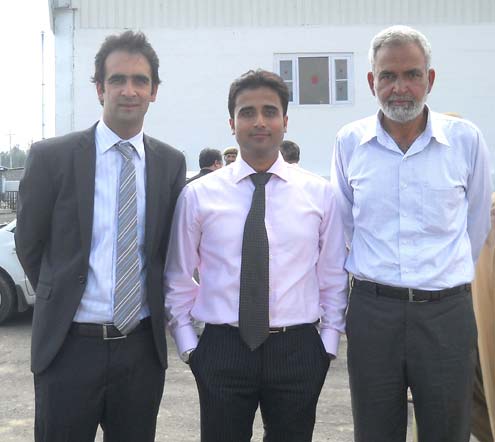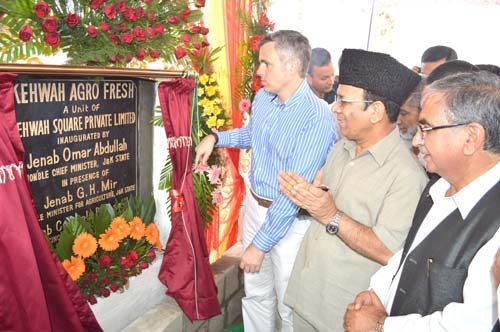A new lot of young entrepreneurs are investing huge money in Controlled Atmosphere Storageunits to help growers keep their produce safe. Syed Asma reports the fruitful bonding between orchardists and entrepreneurs that is helping Kashmir’s horticulture sector sail through the neglect.
Around 29 kilometres from the summer capital city, Srinagar, a number of Controlled Atmosphere Storage (CA)units are coming up in industrial estate Lassipora- Pulwama.
Early this week chief minister Omar Abdullah inaugurated a 2000 ton CA unit, besides laying a foundation stone for a 5000 ton CA packhouse for Apple and multi-fruits.
With already four units (22000-ton capacity) running in the area, and several others in various implementation stages, Omar says, Kashmir is chasing the target of 1 lakh ton capacity in CA by 2015. That would be huge, he adds.
Himachal Pradesh, J&K’s competitor in apple production, is offering double the capacity ofCA units which Omar is hopeful to beat soon.
In CA chambers different gases mostly Oxygen and Nitrogen are regulated under specific atmospheric pressure to increase shelf life of the fruit. In Kashmir, the technology is used to preserve Apple.
The newly inaugurated 2000 ton CA unit, ‘The Golden Apple’,is a tri-party project of local entrepreneurs, Ehsan Javed, Farooq Tramboo and Farooq Amin. The idea of establishing a CA unit stuck the trio during 2008 unrest when the national highway was blocked and local apple produce could not reach its market in given time, says Ehsan.“Our orchardist then had to face huge loss as they could not store their produce.”
This15 crore project is the smallest working CA unit in the Valley. Incorporating the latest Italian technology in their venture, Farooq Amin says, the trio is working on its expansion. Though, all the facilities like washing, sorting, grading, waxing and packing of apples are done in the unit, but the capacity is a bit less as compared to the other units running here, he says.
The other project, ‘Kehwa Agro’ with 5000-ton capacity is owned by Sheikh Imran, an entrepreneur. Investing about Rs 75 crores in the project, Imran says, apart from offering the facility of CA units, he will be placing a processing unit in there as well.
“My unit once ready would be having a CA unit along with a juice processing unit and a dry apple chips making unit. It would be first of its kind in Kashmir,” says Imran.
In Kashmir the technology of CA was introduced back in 1989 by researchers in SKAUST-Kashmir, says R K Sharma, Director of National Horticulture Board. He adds,back then it could not be a success because of the prevailing circumstances.
After 15 years, in 2004, Altaf Bukhari adopted German Technology and established a 1200 ton capacity CA unit which was later expanded to 4200 ton. It was first in Kashmir and started revolutionised the horticulture sector in Kashmir, experts say.

Bukhari, thoughintroduced the technology,but could not survive in the business for long; others came up with comparatively successful business models and sustained.
Mir Khurram, a US return, in 2009 established Harsha Naturals includinga 2200 ton CA unit which was later expanded to 5000 ton capacity and then to 10,000 ton- the highest in the Valley.
He is among the pioneers who introduced the cold storage and CA technology in the Valley and is the most successful among them all, says Sheikh Imran, his competitor in the business.
“I will be soon introducing an automatic packing system at the cost of Rs 9 crores. I am importing 8 automatic packing machinesfrom Italy @ Rs 3 lakh each,” says Khurram.
The automatic packing system will pack 13 metric ton per hour which is many folds better than the manual system that presently exists.
Apart from working on expansion of the already existing infrastructure of his CA units, Khurram is working on making a new system a success; ‘apple traceability’ where in a consumer, sitting anywhere in the world, can trace a farmer, living in Kashmir.
“Khurram is spending capital worth crores of rupees to offer a world class system in Kashmir which hopefully others will follow,” says Neelkant Bakshi, Managing Director of Packolabel Systems Pvt. Ltd in India. Packolabel is an Italian company which is providing technical support to most of the CA units running in Lassipora.The CA facility available in Kashmir is incorporating technology from Germany, France, Italy and Netherlands. Young entrepreneurs are hopeful that their investments will be fruitful for local farmers.
Despite making many efforts,government has not been successful in bringing any major change in the sector. Accepting their failure and the importance of fruit viz-a viz its economy, the government is ready to provide any sort of help to make these project a success.
In India, Kashmir is one of the leading horticulture states, says Dr Asgar Samoon, CommissionerSecretary, Agriculture. “Kashmir produces about 23 lakh tons of fruits a year, most of which is exported to foreign countriesmaking a business of about Rs 4000-5000 crore.”Apple is the dominating fruit in the business.
A decade ago, the orchardists of Kashmir used to pack their produce in wooden box and send it to India without knowing the demand of the market.
“Our normal practice is to collect our produce, fruits, and blindly flood the Indian market,” says Ghulam Ahmed, an orchardist from Shopian. “At times we used to get significant price butmostly we were exploited.”
“But now we have the facility available where we can store our produce [fruits] and use it in off-season to earn better. I am told we can make Kashmiri apple a 12 month product which is good for our business,” says Ahmed.
Introducing a new technology in Kashmir isn’t easy; people take time to get adjusted with it. Mir says in 2008 when he started his CA unit, about 95% capacity went to the Multinational Company and the rest to farmers but last year about 75% capacity was occupied by the local farmer and 25% was given on rent to the MNCs.
Contend with the overall response of the government and orchardists, young entrepreneurs are hopeful they would be a reason for the change.
Neelkant Sharma says, “Italy too has the same production of apple (around 20 lakh)but have 600 CA pack houses in place.”
Besides, state’s chief suggests replacing the old stocks of trees to improve its 9 ton per hectare yield and raise it up to 25 ton per hectare. “If we are able to produce 35 lakh ton of apples annually it would definitely generate economic activities and would help to strengthen the economy,” concludes Abdullah.
















